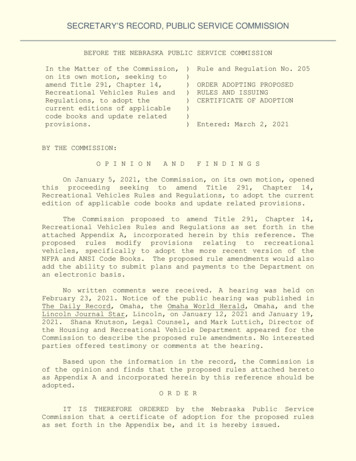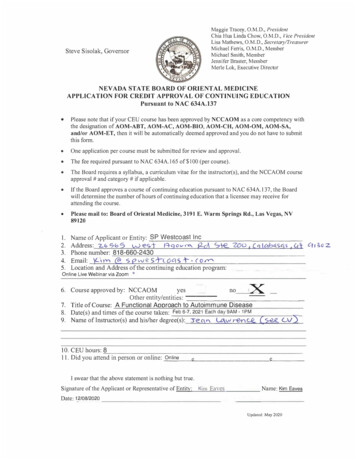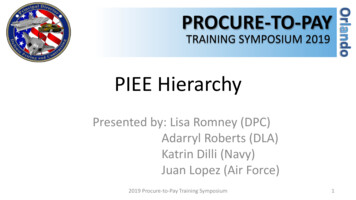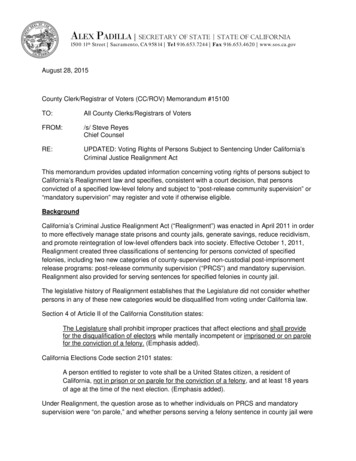
Transcription
ALEX PADILLA SECRETARY OF STATE STATE OF CALIFORNIA1500 11th Street Sacramento, CA 95814 Tel 916.653.7244 Fax 916.653.4620 www.sos.ca.govAugust 28, 2015County Clerk/Registrar of Voters (CC/ROV) Memorandum #15100TO:All County Clerks/Registrars of VotersFROM:/s/ Steve ReyesChief CounselRE:UPDATED: Voting Rights of Persons Subject to Sentencing Under California’sCriminal Justice Realignment ActThis memorandum provides updated information concerning voting rights of persons subject toCalifornia’s Realignment law and specifies, consistent with a court decision, that personsconvicted of a specified low-level felony and subject to “post-release community supervision” or“mandatory supervision” may register and vote if otherwise eligible.BackgroundCalifornia’s Criminal Justice Realignment Act (“Realignment”) was enacted in April 2011 in orderto more effectively manage state prisons and county jails, generate savings, reduce recidivism,and promote reintegration of low-level offenders back into society. Effective October 1, 2011,Realignment created three classifications of sentencing for persons convicted of specifiedfelonies, including two new categories of county-supervised non-custodial post-imprisonmentrelease programs: post-release community supervision (“PRCS”) and mandatory supervision.Realignment also provided for serving sentences for specified felonies in county jail.The legislative history of Realignment establishes that the Legislature did not consider whetherpersons in any of these new categories would be disqualified from voting under California law.Section 4 of Article II of the California Constitution states:The Legislature shall prohibit improper practices that affect elections and shall providefor the disqualification of electors while mentally incompetent or imprisoned or on parolefor the conviction of a felony. (Emphasis added).California Elections Code section 2101 states:A person entitled to register to vote shall be a United States citizen, a resident ofCalifornia, not in prison or on parole for the conviction of a felony, and at least 18 yearsof age at the time of the next election. (Emphasis added).Under Realignment, the question arose as to whether individuals on PRCS and mandatorysupervision were “on parole,” and whether persons serving a felony sentence in county jail were
“imprisoned” for purposes of Section 4 of Article II of the California Constitution and Section2101 of the Elections Code.On December 5, 2011, the former Secretary of State issued a memorandum (CCROV #11134)to elections officials concluding that individuals on PRCS and mandatory supervision are noteligible to vote under the California Constitution because PRCS and mandatory supervision arethe functional equivalent of “parole.” The memorandum also concluded that a person serving afelony sentence in county jail under Realignment is not eligible to vote because they are“imprisoned.”On February 4, 2014, a lawsuit was filed in Alameda Superior Court (“Superior Court”)challenging CCROV #11134, claiming that individuals on PRCS and mandatory supervision areeligible to vote under the California Constitution (Scott v. Bowen, case no. RG14712570).On May 29, 2014, the Superior Court issued a final judgment rejecting the interpretation ofRealignment in CCROV #11134. The Superior Court held “as a matter of law that CaliforniaConstitution Article II, Section 2 and Elections Code 2101, require the State of California toprovide all otherwise eligible persons on [mandatory supervision and PRCS] the same right toregister to vote and to vote as all otherwise eligible persons.”1 The court concluded thatrestoring voting rights of persons under PRCS and or mandatory supervision is consistent withthe Realignment policy goal to promote reintegration of low-level offenders back into thecommunity. In addition, the court relied upon the long-held principle in California law requiringcourts “to give every reasonable presumption in favor of the right of people to vote” and to “notengage in any construction of an election law that would disenfranchise any voter if the law isreasonably susceptible of any other meaning.”On June 5, 2014, the Superior Court issued a writ of mandate ordering the Secretary of State towithdraw CCROV #11134 and notify elections officials that it had been withdrawn. (TheJudgment and Order are attached to this CCROV.)On June 13, 2014, the former Secretary of State filed a timely notice of appeal of the SuperiorCourt ruling with the First District Court of Appeal (Scott v. Bowen, case no. A142139). OnJanuary 5, 2015, when Secretary of State Alex Padilla assumed office, the appeal was stillpending.CCROV #11134 Is WithdrawnOn August 3, 2015, Secretary Padilla announced an end to the appeal of Scott v. Bowen andwill comply with the Superior Court decision pursuant to a settlement of the case with plaintiffs.Accordingly, this memorandum shall serve as notification to elections officials that CCROV#11134 is withdrawn. CCROV #11134 will no longer be found on the Secretary of State1The Superior Court decision did not address the conclusion in CCROV #11134 that persons convicted of a felonyand serving time in county jail under Realignment are ineligible to vote. That issue will be addressed in a futureCCROV subject to any clarification that the Legislature may provide.
website. Additionally, the Secretary has prepared new language for the affidavit on the paperversion and online version of the Voter Registration Card and updated the language containedin other voting materials and voter education materials consistent with the Superior Court rulingand settlement. The revised voter materials specify the voting rights of persons subject to twocategories of county-supervised non-custodial post-imprisonment release programs underRealignment as follows:Post Release Community Supervision (PRCS): A person released from prison on or afterOctober 1, 2011, for a conviction of a crime defined by Realignment as a low-level felony, andwho is released from state prison to county-supervised PRCS, is eligible to register and vote.Mandatory Supervision: At the time a judge sentences a person to county jail for theconviction of a specified low-level felony, Realignment authorizes a judge to order that theperson be released and supervised by a probation officer for a specified, concluding portion ofthe term. Following release from county jail and during the period of supervision, this person iseligible to register and vote.The penalty of perjury statement on the printed voter registration card has been modified to thefollowing:I am a U.S. citizen and will be at least 18 years old on election day. I am not currentlyimprisoned or on parole for the conviction of a felony. I understand that it is a crime tointentionally provide incorrect information on this form. I declare under penalty of perjuryunder the laws of the State of California that the information on this form is true andcorrect.This new language for the affidavit on the paper version has been incorporated in the quarterlyvoter registration card order to be delivered to counties by September 30, 2015.A copy of the Secretary of State’s Voting Rights for Californians with Criminal Convictions orDetained in Jail or Prison, which summarizes the voter registration eligibility requirements ofpersons with criminal convictions, is attached to this CCROV.We encourage elections officials and county probation departments to update all printed andonline outreach materials. Online registration opportunities are available atRegisterToVote.ca.gov.Please feel free to contact me at steve.reyes@sos.ca.gov if you have any questions concerningthis memorandum.
I llllll lllll lllll 111111111111111111111111111111111*12288449*2AfM b TY34MAY 2 9 Z0145ey/ .678SUPERIOR COURT OF THE STATE OF CALIFORNIA9COUNTY OF ALAMEDA10111213-1415MICHAEL SCOTT, LEON SWEETING,MARTIN CERDA, ALL OF US ORNONE, LEAGUE OF WOMEN VOTERSOF CALIFORNIA, DORSEY NUNN, andGEORGE GAL VIS,Case No. RG14712570ASSIGNED FOR ALL PURPOSES TOJUDGE: EVELIO GRILLODEPARTMENT 31Plaintiffs, [PROl"OSHI ] JUDGMENT161718v.Dept:Judge:DEBRA BOWEN, Secretary of State ofCalifornia,31The Honorable Evelia GrilloAction Filed: February 4, 201419Defendant.202122Petitioners challenge Respondent Secretary of State's determination that otherwise eligible23Californians on Mandatory Supervision (Penal Code § 1I 70(h)(5)(B)) and Post-Release24Community Supervision ("PRCS") (Penal Code § 3451) are ineligible to vote. Their motion for a25peremptory writ of mandate was fully briefed and was heard on April 2, 2014, in Department 3 t26of this Court, the Honorable Evelia Grillo presiding. Michael Risher appeared as attorney for the27Petitioners; Deputy Attorney General Seth Goldstein appeared as attorney for Respondent28Secrntary of State Debra Bowen.[Proposed] Peremptory Writ of Mandate (RG 14 712570)
·I.After consideration of the briefing, evidence, and argument, and for the reasons set forth in2its May 7, 2014 statement of decision, it is the judgment of this court that31.4Cali :u:ni:a Ca1tstitatit 11 A:tielc ll, 1ili'1tigR 2ltnd Elections.Code 2101 requin; the State ofCalifornia to provide all otherwise eligible persons on Mandatory Supervision and PRCS the56g . same right to register to vote and to vote as all other otherwise eligible persons.2.Secretary of State County Clerk/Registrar of Voters Memorandum # 11134 is an invalid7underground regulation, issued in violation of the notice-and-comment provisions of the8Administrative Pro'cedure Act, Government Code § 11340 et seq.9101112It is therefore ORDERED that the petition for a writ of mandate is granted.The court directs the clerk to issue a peremptory writ of mandate that directs RespondentSecretary of StateJlebra Bowen to do all.of the following·I) withdraw CC-ROY Memorandum No. 11304, issued December 5, 201113("Memorandum") by notifying any individual or entity to whom you have disseminated the14Memorandum that it has been withdrawn and is no longer in effect, and by removing any public15postings of the Memorandum;16172) refrain from producing or disseminating any voting materials that indicate that.individuals on Po·st-Release Community Supervision (PRCS) and mandatory supervision are18prohibited from registering to vote or voting. "Voting materials" includes but is not limited to19voter registration affidavits, voter information or education materials, instructions or guidance to20county elections officials, including any such materials on your website.213) notify every county's elections officials that any voting materials that you have22previously produced and/or disseminated that indicate that individuals on PRCS and mandatory23supervision are prohibited from registering to vote or voting are incorrect as a matter of law and24should not be utilized in any manner.254) to the extent you produce or disseminate any new voting materials that discuss the voting26eligibility of persons on parole, those materials must indicate that otherwise-eligible persons on27Mandatory Supervision and Post Release Community Supervision have the same right to register28to vote and to vote as all other otherwise eligible persons.2[Proposed] Peremptory Writ of Mandate (RG 14712570)
'Nothing in the writ will prevent the Secretary of State's Office from issuing a new CC-2ROY or new memorandum related solely to the topic of persons serving felony sentences in3county jail under Penal Code § 1l70(h).4The writ wi II not go into effect for 15 days to allow Respondent to file a notice of appeal.5Respondent will file a return within 45 days after the writ goes into effect, stating with specificity6the actions you have taken to comply with the writ.7ITrs so Proposed] Peremptory Writ of Mandate (RG 14712570)
SUPERIOR COURT OF CALIFORNIACOUNTY OF ALAMEDACase Number: RG14712570Case Name: Scott vs. Bowen1. JudgmentDECLARATION OF SERVICE BY MAILI certify that I am not a party to this cause and that a true and correct copy of theforegoing document was mailed first class, postage prepaid, in a sealed envelope, addressed asshown below by placing it for collection, stamping or metering with prepaid postage, andmailing on the date stated below, in the United States mail at Alameda County, California,following standard court practices.I declare under penalty of perjury that the foregoing is true and correct. Executed onJune 2, 2014) ·.Executive Officer/Clerk of the Superior CourtBy M. Scott Sanchez, Deputy ClerkRisher, Michael T.ACLU Foundation of Northern California39 Drumm StreetSan Francisco, CA 94111 Suite 125Sacramento, CA 952442550
1*12288106*FILED1ALAMEDA COUNTY2MAY - 7 2014345SUPERIOR COURT OF THE STATE OF CALIFORNIA6IN AND FOR THE COUNTY OF ALAMEDA78910ICHAEL SCOTT, et al,Case No. RG14-712570Plaintiffs,ORDER (1) GRANTING PETITION OFPETITIONERS FOR WRIT OF MANDATENISSUEOF REMEDY.v.ate o12DATE:TIMEDEPT.Defendant.134/21141:30 PM3114151617The petition of Michael Scott, et al ("Petitioners") for a writ of mandate came on for18hearing on April 2, 2014, in Department 31 of this Court, the Honorable Evelio Grillo presiding.19After consideration of the briefing and the argument, IT IS ORDERED: The petition for a writ20of mandate is GRANTED.21221. The court holds ·as a matter of law that Election Code 2101 requires that the State ofCalifornia provide all otherwise eligible persons on Mandatory Supervision (Penal23Code l l 70(h)(S)(B)) and Post-Release Community Supervision ("PRCS") (Penal242526Code 3451) the same right to register to vote and to vote as all other otherwiseeligible persons.1
122. The court directs the parties to meet and confer regarding the appropriate scope of theremedy and the text of a proposed judgment and writ. If the parties cannot reach3agreement, then on or before May 21, 2014, the parties may file cross-opening briefs4of up to 8 pages on the remedy. On or before May 28, 2014, the parties may file5cross-opposition briefs of up to 5 pages on the remedy. The court will hold a further6hearing on the remedy at 1:30 pm on June 4, 2014, in Department 31.78EVIDENCE.910The court GRANTS the requests of Petitioners for judicial notice of Exhibits A-G. Superior Court (2113) 57 Cal.4th 157, 171), of Exhibit H12(legislative history in the form of ballot Initiative materials) (Sierra Club, supra.), and of Exhibit13I (data from Chief Probation officers of California website) (People v. Alexander ( 1985) 16314Cal.App.3d 1189, 1201 fn3).15The court GRANTS the request of the Secretary for judicial notice of Exhibit 1 (The16Memorandum), of of Exhibits 2-3 (Court records), of Exhibits 4-8 and 11-14 (legislative17history). (Sierra Club, supra.), and of Exhibits 9-10 (Governor's budget summary) (Carmel1819Valley Fire Protection Dist. v. State (2001) 25 Cal.4th 287,293, fn 2).2021FACTUAL BACKGROUND.22The first California Constitution, adopted in 1849, permanently disenfranchised all2324persons "convicted of any infamous crime.;; In 1972, the voters passed an initiative to amendthe California Constitution to state: "[T]he legislature shall prohibit improper practices that affec25elections and shall provide that no severely mentally deficient person, insane person, person262
123456convicted of an infamous crime, nor person convicted of embezzlement or misappropriation ofpublic money shall exercise the privileges of an elector in this State." (League of Women Votersof California v. McPherson (2006) 145 Cal.App.4th 1469, 1475-79 [historical summary].)On 1114/74 the people of the State of California through a referendum amended theCalifornia Constitution, Article II to read: "The Legislature shall prohibit improper practices thataffect elections and shall provide for the disqualification of electors while mentally incompetent7or imprisoned or on parole for the conviction of a felony."8On 1112/10, a three judge panel of the federal District Court ordered California to reduce91012its prison population to 137.5% of the prisons' design capacity within two years. (Coleman v.In 2010, the California Governor proposed a realignment plan that included what the13Legislative Analyst's Office described as a "Proposal to Shift Adult Parole" (Secretary RJN, Ex.148, pp12-14.) The Legislative Analyst stated that the Governor's proposal was designed to both15reduce the cost to the state and to "improve offender outcomes and reduce their risk of16reoffending." The Governor later issued Budget Summaries that stated his goals. (Secretary17RJN, Ex. 9, 10.)1819On 4/4/11, AB109 (the "Realignment Act") was filed with the Secretary of State. Sectio20479 of the Realignment Act added Penal Code 3450 et seq, which "shall be known and may be21cited as the Postrelease Community Supervision Act of 2011."222324The Legislature's stated purpose for the Realignment Act and in the PostreleaseCommunity Supervision Act was to address both the stagnant or worsening reincarceration ratesand the unsustainable policy of building and operating more prisons by reinvesting criminal255/23/l t, the United States Supreme Court affirmed the decision directing Californiato reduce its prison population. (Brown v. Plata (2011) 131S.Ct.1910.)1 On263
12justice resources to support community-based corrections programs with the goal of achievingimproved public safety returns. To accomplish this goal, the Realignment Act transferred3responsibility for low-level felony offenders who do not have prior convictions for serious,4violent, or sex offenses to locally run community-based corrections programs with the goal of5improving public safety outcomes and facilitating their reintegration back into society. (Penal6Code l 7.5(a)(l)-(6); Penal Code 3450(a)(l)-(6).) The Legislature noted that such correctional7practices would align with sound fiscal policy because the realignment will "manage and allocate8criminal justice populations more cost-effectively, generating savings that can be reinvested in910evidence-based strategies that increase public safety while holding offenders accountable."-----1:-r12The Realignment Act created two new forms of noncustodial supervision:13Mandatory Supervision. The Realignment Act states thatwithout prior or current felony convictions for serious, violent, or sexrelated crimes are sentenced to county jail rather than to state prison. (Penal Code1l70(h).) Under Penal Code 1l70(h)(S)(B), the court may suspend the term andrelease the defendant to Mandatory Supervision, "during which time thedefendant shall be supervised by the county probation officer in accordance withthe terms, conditions, and procedures generally applicable to persons placed onprobation." A person on Mandatory Supervision is serving their felony sentenceunder the supervision of a county probation officer instead of in a county jail.14151617 defendant 18192021222324 Post-Release Community Supervision ("PRCS"). The PostreleaseCommunity Supervision Act states that defendants without prior or current felonyconvictions for serious, violent, or sex related crimes will, upon release from stateprison, "be subject to community supervision provided by a county agency."(Penal Code 34Sl(a).) A person on PRCS is serving their mandatory period ofsupervision following release under the supervision of a county agency instead ofthe state Department of Corrections and Rehabilitation.There is no indication that the Legislature ever considered how the creation of MandatorySupervision or PRCS would affect the voting rights of persons who would be placed on25Mandatory Supervision or PRCS.264
.12On 12/5/11, Respondent Debra Bowen as California Secretary of State (the "Secretary")issued Secretary of State County Clerk/Registrar of Voters Memorandum # 11134 (the3"Memorandum"). The Memorandum was supported by an 18 page legal analysis and concluded4that persons on Mandatory Supervision or PRCS were ineligible to vote because mandatory5supervision was "akin to parole." (Secretary RJN, Ex. 1.) The Memorandum reasoned that6PRCS is "functionally equivalent" to parole (Memorandum, page 11) and that Mandatory7Supervision is a "form of probation that is more akin to parole than to [] post-conviction, pre-ssentencing probation" (Memorandum, page 13). When the Secretary issued the Memorandum910there was no case law interpreting the the Realignment Act and addressing whether, or how,------.-r-tt-- -l· pervision m PRCS were different from parole.12On 3/7/12, an organization filed a petition directly in the Court of Appeal seeking to13resolve whether otherwise eligible persons on Mandatory Supervision and PRCS had the right to14vote. On 5/17/l.2, the Court of Appeal denied that petition without issuing an opinion.15(Secretary RJN, Ex. 2.) On 5/30/12, the petitioner sought review in the California Supreme16Court. On 7/26/12, the California Supreme Court denied the petition for review without issuing17an opinion. (Secretary RJN, Ex. 2.)1819On 2/22/13, Assemblyman Weber introduced AB938, which would have amended20Elections Code 2101 to state that Mandatory Supervision and PRCS are not state parole. The21bill's author stated that it "clarifies that people sentenced pursuant to the Criminal Justice22Realignment Act retain their constitutional right to vote." The legislative analyst stated that the23bill would make "significant changes to voter eligibility." (Secretary RJN, Exh 5.) Ultimately24the bill was withdrawn by its author before it was subjected to a vote by the full Assembly.25There is no evidence in the record of any legislator having introduced any legislation to state265
123affirmatively that Mandatory Supervision and PRCS are within the definition of "parole" forpurposes of voting rights.This petition squarely presents the question of whether in enacting the Realignment Act4the Legislature intended Mandatory Supervision and PRCS to be "parole" for purposes of voting5rights under the California Constitution, Article II, Section 2 and Election Code 2101.67PROCEDURE.8Plaintiff seeks a traditional writ of mandate under CCP 1085 to compel the Secretary to91012perform the ministerial duty of permitting qualified voters to register. Mandamus is the properPrisoners with Children v. Bowen (2009) 170 Cal.App.4th 447, 451 fn 2.)131415ANALYSIS.THE COURT OF APPEAL HAS DETERMINED THAT MANDATORY SUPERVISION AND16PRCS ARE NOT "PAROLE."17Stripped to its essence, Petitioner's argument is (1) Elections Code 2101 states that1819United States citizens who are residents of California and "not in prison or on parole for the20conviction of a felony" are entitled to register to vote; (2) persons on Mandatory Supervision and21PRCS are not on "parole for the conviction of a felony," so (3) persons on Mandatory22Supervision and PRCS are entitled to register to vote. Petitioner's argument finds substantial23support in three recent opinions published by three separate panels of our Court of Appeal, each24of which concluded that Mandatory Supervision and PRCS are not "parole." People v. Cruz25266
12(2012) 207 Cal.App.4th 664; People v. Fandino/a (2013) 221 Cal.App.4th 1415; People v. Isaac(2014) 224 Cal.App.4th 143.3In People v. Cruz (2012) 207 Cal.App.4th 664, the Court of Appeal (Fifth District) held4that disparate treatment of defendants sentenced before and after operative date of Realignment5Legislation did not violate equal protection. In the course of reaching that decision, the Court6noted that a defendant sentenced under Penal Code 1170(h), whether for a straight jail term or a7hybrid term of jail time and Mandatory Supervision, is not subject to a state parole period after8his or her sentence is completed. The Court then observed, "Accordingly, such a defendant is910not subject to a parole revocation restitution fine." (207 Cal.App.4th 672 fn 6.) The holding that "H-- J-i:l--P' nH temn c ed.t-W-to"MandatoryS12fine," is a holding that Mandatory Supervision is not "parole."13In People v. Cruz, supra, 207 Cal.App.4th at 672, the Court of Appeal also stated, "A14defendant sentenced to state prison is subject to a mandatory period of supervision following15release, either parole supervision by the state ( § 3000 et seq.), or postrelease community16supervision by a county probation department ( § 3450 et seq.)." The reference to parole and17PRCS in the alternative is a strong indicator that PRCS is not "parole."1819In People v. Fandino/a (2013) 221 Cal.App.4th 1415, the Court of Appeal (Third20District) directed the parties to address whether the court could impose a probation supervision21fee under Penal Code 1203 .1 b where a defendant was sentenced to Mandatory Supervision under22Penal Code l l 70(h). The Court of Appeal resolved the issue, stating "We conclude the answer i23no." After reviewing the plain text of 1203.1 b (the probation supervision fee), the Court24observed that the Legislature, following enactment of the Realignment Act, amended Penal Code251202.45 (concerning a parole revocation restitution fine) to also provide for a "mandatory267
12supervision revocation restitution fine." The Court then stated, "this amendment indicates theLegislature understood mandatory supervision is neither probation nor parole, and specific3authorization for a mandatory supervision revocation restitution fine was therefore required even4though probation and parole revocation restitution fines were already authorized by sections51202.44 and 1202.45, respectively." (Emphasis added.) The finding that "the Legislature6understood mandatory supervision is neither probation nor parole" is tantamount to a holding7that Mandatory Supervision is not "parole."8In People v. Isaac (2014) 224 Cal.App.4th 143, the Court of Appeal (First District) held910that the trial court lacked authority to impose a parole revocation restitution fine because the12Cruz, 207 Cal.App.4th at 672 fn 6, that under former Penal Code 1202.45, "defendants facing13[Mandatory Supervision] instead of parole are 'not subject to a parole revocation restitution14fine.'" The court then addressed the Attorney General's argument that under former Penal Code151202.44, a defendant's sentence to PRCS was "substantially equivalent to a 'conditional16sentence' referenced in [Penal Code 1202.44]." The court found no merit to the "substantially17equivalent" argument advanced by the Attorney General. The court noted that the defendant was1819sentenced to PRCS and that PRCS is different from the statutory definition of "conditional20sentence" in Penal Code 1203(a). (Isaac, 224 Cal.App.4th at 147.) The court then observed that21"the Attorney General's sweeping interpretation of the term "conditional sentence" under section221202.44 would render that section applicable to parolees, and make the original provisions of231202.45, now located in subdivision (a), entirely superfluous." (Isaac, 224 Cal.App.4th at 148.)24The holding that a person sentenced to PRCS is not subject to a parole revocation restitution fine,25is a holding that PRCS is not "parole."268
12This trial court is required to follow the Court of Appeal's decisions in Cruz, Fandino/a,and Isaac. (People v. Taylor (2009) 47 Cal.4th 850, 880 [Court of Appeal decisions are binding3on a trial court].) (See generally Auto Equity Sales, Inc. v. Superior Court ofSanta Clara Coun4(1962) 57 Cal.2d 450, 455). 2 The Secretary must raise an argument in the trial court to preserve5it for appeal, but a trial court is not free to reach a conclusion contrary to that of the Court of6Appeal.7In short: (1) the plain language of Elections Code 2101 states that United States citizens8who are residents of California and "not in prison or on parole for the conviction of a felony" are910entitled to register to vote; (2) Cruz, Fandino/a, and Isaac each hold that Mandatory Supervisionare not "parole," so (3) persons on Mandatory Supervisien and PRC8 are ent'12131415register to vote.The court can discern two potential arguments with the above analysis and conclusion.First, Cruz, Fandino/a, and Isaac addressed whether Mandatory Supervision and PRCS were"parole" under Penal Code 1202.44 and 1202.45, not whether Mandatory Supervision and PRCS16were "parole" under Elections Code 2101. Cruz, Fandino/a, and Isaac never considered17Elections Code 2101 or voting rights. Cases are not authority for propositions not decided.1819·20(Santisas v. Goodin (1998) 17 Cal.4th 599, 620.) Second, Cruz, Fandino/a, and Isaac addressedthe definitions of Mandatory Supervision, PRCS, and parole under Penal Code 1202.44 and211202.45, and "parole" could have a different definition for purposes of Elections Code 2101.22(Harris v. City ofSanta Monica (2013) 56 Cal.4th 203, 222; Heritage Residential Care, Inc. v.23Division of Labor Standards Enforcement (2011) 192 Cal.App.4th 75, 84.)2425262 (See also Lavie v. Procter & Gamble Co. (2003) 105 Cal.App.4th 496, 514 (Haerle,concurring) [Stating "As I am sure the Attorney General's office understands, we are required tofollows applicable precedent" and noting that the Attorney General's office was asking court "tobecome the only court to" adopt the asserted reading of the statute].)9
1The court is not persuaded by either argument. First, in prior appellate cases, Attorney2General Opinions and administrative memoranda, the Court of Appeal, the Attorney General,3and the Secretary of State have all relied on the Penal Code when considering California4Constitution Article II, section 4 and Elections Code 2101. (McPherson, l 45 Cal.App.4th 1469;5Floodv. Riggs (1978) 80 Cal.App.3d 138, 153 fn 19; 88 Ops. Cal. Atty. Gen. 207; Ptnr, RJN,6Ex. 1 (Memorandum).) If the Court of Appeal, the Attorney General and the Secretary of State7rely on the Penal Code when seeking to define "parole" in various contexts, then this courtBshould similarly rely on the Penal Code when determining the meaning of "parole" in the context9of Elections
superior court of the state of california county of alameda 10 11 12 michael scott, leon sweeting, 13- martin cerda, all of us or none, league of women voters 14 of california, dorsey nunn, and george gal vis, case no. rg14712570 assigned for all purposes to judge: evelio grillo depar
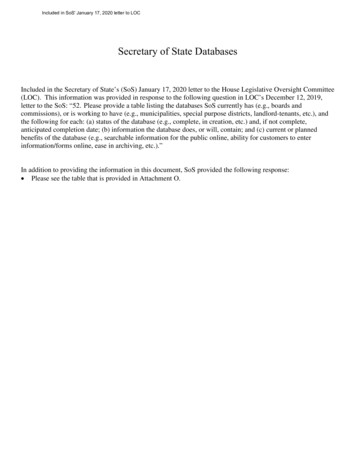
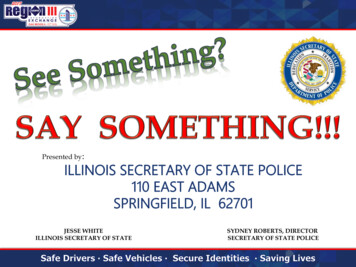


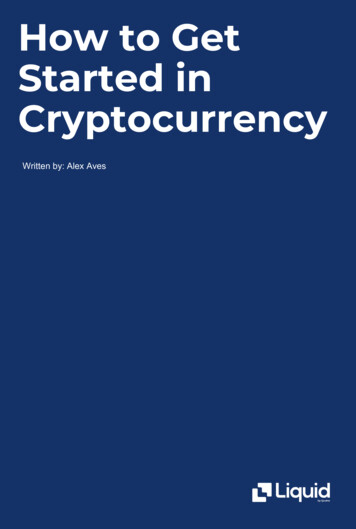
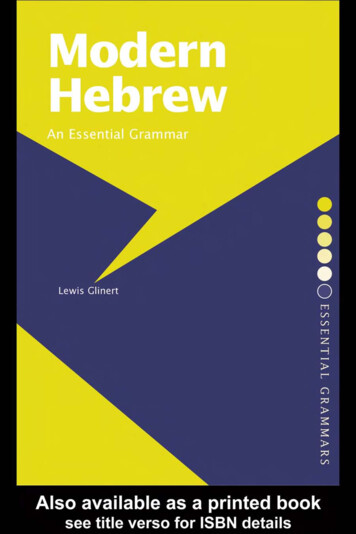
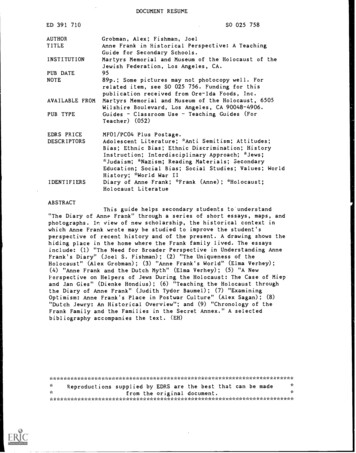
![[SEAL] Secretary. [File No.](/img/8/fr002199.jpg)

